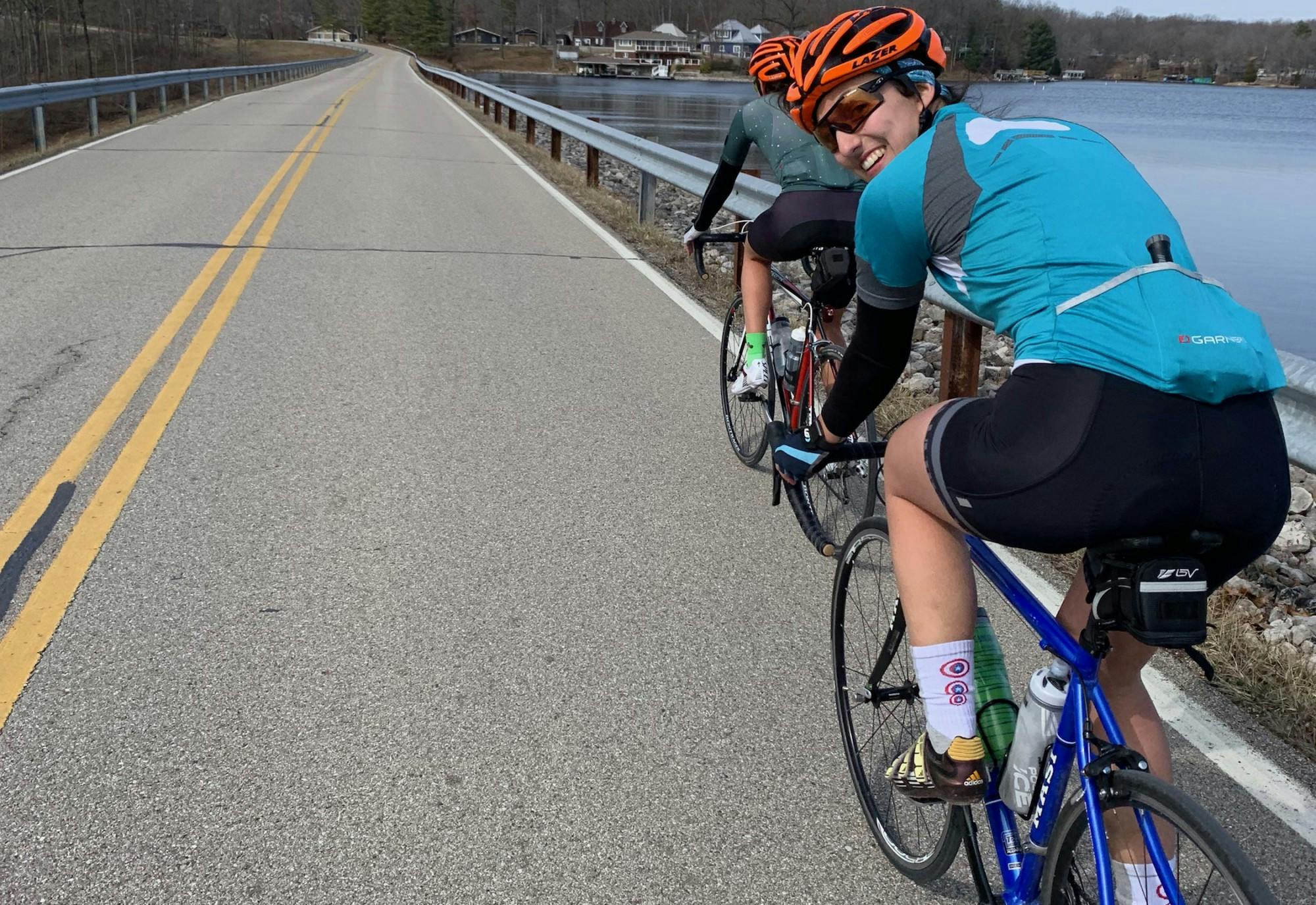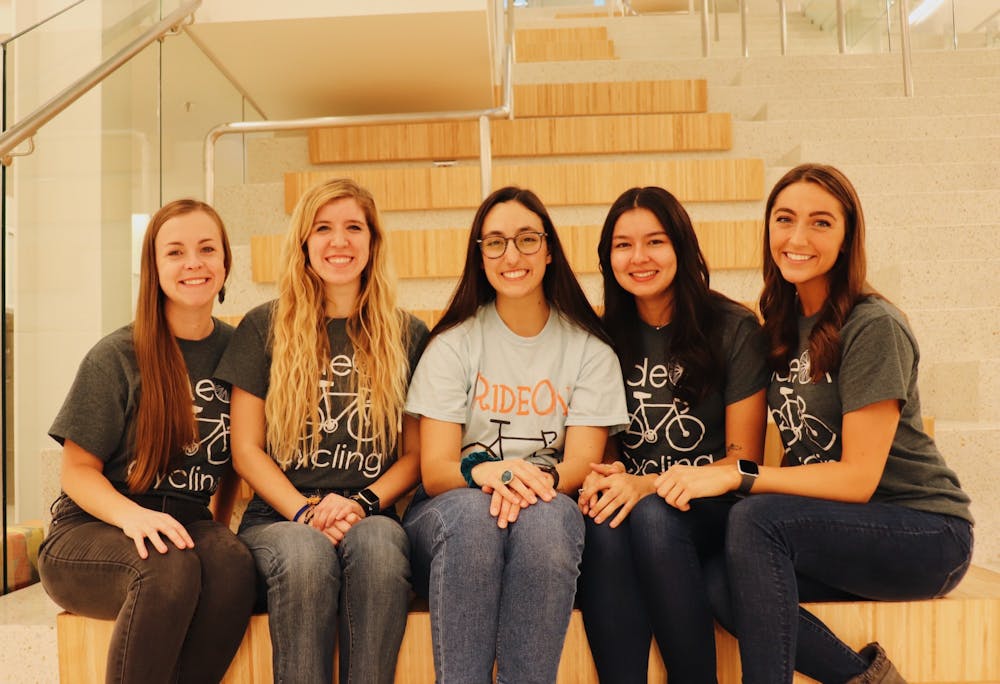Kelly Garrison doesn’t remember much from her first spring track practice in 2019. Not the bike jetting into her lane. Not slamming on her breaks. Not flying headfirst over handlebars. Not crashing downward onto the track at Bill Armstrong Stadium.
She was told about the first spring practice of 2019 later by her teammates.
Kelly, now a senior at IU, could only recall how bright everything was. She couldn’t make sense of her surroundings and quickly became worried about her tooth. She realized that her lower right canine wasn’t fully rooted in her gums anymore.
Her coach, Carl Field, saw it unfold right in front of him.
He saw a girl from a fellow team forget to check over both shoulders after completing a hand off in the pit area. He saw the girl turn her bike 90 degrees into the adjacent lane. He saw Kelly barreling forward at close to 20 miles per hour.
All Field could do was watch her flipping onto the asphalt.
Beth Garrison’s phone rang just as she walked into church. When she answered the call, she heard her daughter crying in the background.
“Her head hurts really bad,” a rider at the track told Beth.
Mike Garrison, who was with his wife at church, took off for the 45-minute drive from Greenwood, Indiana, to Bloomington. He is a former firefighter and emergency room nurse who knew how to handle traumatic injuries.
“Take her to the ER,” Mike told her teammate.
Mike hoped that it was just a concussion. When he saw Kelly, he knew it was more serious.
Kelly, 21, sat in the emergency room with what she would later learn was a broken jaw and right collarbone. All she wanted to do was talk about biking.
“How does this affect me?” she said. “How can I get back on the bike?”
Kelly was taken back for X-rays, and soon her father’s prognosis was confirmed. Racing wasn’t an option anymore. After joining the team months earlier, it would have been her first chance to compete in the Little 500.
Through a clenched jaw, broken in two places, Kelly kept asking questions about her team, RideOn.
“How can I help the team without getting on the bike?” she said.
Kelly stayed with her family in the local Bloomington Hyatt over the next couple of nights. Beth was in the hotel room with Kelly and wondered why this happened to her daughter. She thought about how Kelly would finish her junior year. Most of all, she was enraged by the carelessness that led to her daughter’s anguish.
Beth wasn’t ready to come to peace with the riders that caused the accident yet.
Shortly after cracking her head on the ground, Kelly was.
“I forgive her,” Kelly said that night.
Kelly’s jaw was wired shut. Her teeth were immovable after surgery.
“My life was paused,” Kelly said.
She attempted to stay in Bloomington and go to class. She yearned for normal when normal was no longer an option.
On her first day back, Kelly's concussion took over. In class, it felt like everyone was yelling. The lights were blazing down on her.
Beth decided to bring Kelly home permanently. Kelly had to file for two incomplete classes that semester. Riding in the Little 500 wasn't a possibility.
With her jaw bound together, Kelly couldn’t speak. With a broken collarbone, she couldn’t write. One week before the accident, she was training for the experience of a lifetime. Now, she couldn’t open her mouth or lift her arm.
Kelly typed on an iPad to communicate. She would get frustrated and type harder. It didn’t work. So she researched sign language. Eventually, she became a master at talking through shut teeth.
All foods had to be thin enough to fit through the cracks in her teeth. That meant all-you-can eat mashed potato soup. Extra butter. Double sour cream. She drank Ensures to get in more calories. Still, she lost 20 pounds.
“I don’t know if she’ll ever want to eat mashed potatoes again,” Beth said.
Kelly needed help getting dressed and taking showers. Her medicine was delivered through a straw. She couldn’t even lay down in a bed. She had to try to get comfortable in a recliner.
Kelly passed the time by coloring. She started to thumb through a book, but her head pounded. She flipped on a movie, but she couldn’t concentrate. To get some fresh air, Kelly went on walks.
Whenever Kelly was in public, she was required to carry two objects at all times.
One was a sign that said she had a broken jaw. Unlike a broken arm, her injury was concealed.
The second was wire cutters. In case Kelly couldn’t breathe or was choking, the wire cutters could pry her mouth open.
“It was the hardest thing I’ve ever had to go through,” Kelly said.

No one could understand her pain.
Everyone else’s lives continued while Kelly sat at home with a broken jaw and collarbone. On campus, her friends worried about an upcoming test. Kelly didn’t know when she could talk again.
She felt lonely. She was defeated. Her morale was crushed.
Days after her injury, Kelly found out that her grandmother passed away. The family held on to each other tighter than they ever had before.
The stress and pressure triggered past troubles for Kelly.
Earlier that fall, before the crash, a wave of depression and anxiety overtook Kelly. Her mental health deteriorated. She wasn’t sure why.
Beth noticed a change. When they would talk, Kelly didn’t have the lively pep that her mother was accustomed to hearing. It wasn’t the same woman that took on the challenge of biking competitively for the first time in her junior year.
At practices, Kelly would yell encouragement to her teammates. She would always make sure to say people's names to make sure they felt appreciated.
“That’s our climber,” Kelly would call out during training. “Ride for family.”
She would organize movie nights for the team, and they would eat at Siam House.
“Just boundless enthusiasm,” Field said. “She always has a smile on her face. She’s always encouraging everybody. She was so enthusiastic to learn and get better.”
But then it became complicated.
In the fall semester before the crash, Kelly didn’t want to leave her bed. She skipped classes. When Kelly did show up, she avoided contact with classmates. She told coach Field she needed a break from biking.
“It was a survival mode,” Kelly said.
She just wanted to sleep. That’s when she could escape her loneliness.
“Why am I here?” she would think to herself. “Why should I keep getting up everyday?” “Why still be alive if it feels this way?”
Eventually, she was able to identify her destructive thoughts and acknowledged them to her mother. Beth would call Kelly every day. Kelly had to be honest with how she was feeling. It meant asking hard questions.
There were simple goals. Getting up and eating breakfast. Making her bed. Going to class and returning right after.
Kelly talked to a therapist where she released her anxieties and worries. She spoke to doctors about taking medications. She drew pictures. She listened to her favorite band, Kings Kaleidoscope. She traveled home to play with her two Yorkie Bichons, Mocha and Oliver.
“You have good days and bad days, but the bad days get further and further apart,” Kelly said.
She embraced her fears with love.
Kelly also leaned on her faith. She rediscovered herself as a devout Christian. Spreading the love of God with others gave her a newfound purpose.
Around her, there was a community. She realized they’d been there all along.
“Even my coach would give me a hug if I needed it,” Kelly said. “If I needed to go to his house and cry, he was willing to welcome me no matter what I was dealing with.”
By the February before the bike accident, she started to feel like herself again.
“Everyone has negatives in them. It felt like the opposite of who I would be on the outside," Kelly said. "My inside was so negative, but my outside was positive.”
So, as Kelly sat in her house with a broken jaw and collarbone, the memories from earlier in the year overwhelmed her. But this time it was different. She had overcome her anxieties before.
Meanwhile, injuries to other team members prevented RideOn from competing in the Little 500. The team had finished in the top 10 in the last two years.
Slowly, Kelly was able to move her right arm. She could put on her own clothes. Then, talk and eat. Eventually, her headache alleviated.
Kelly became herself again.
“She has moments where she gets down, but Kelly won’t stay defeated,” Beth said.
Kelly imagined herself in front of a packed crowd at Bill Armstrong Stadium on April 24 — the date of the 2020 women’s Little 500. She would’ve stood on the track and soaked up the excitement with all of her teammates, knowing everything she had overcome. She knew RideOn would have been a surprise in the race.
All of that hope was interrupted by an email. Kelly had just gone for a ride and finished showering when she checked her phone on March 15. It was flooded with text messages.
“You must be devastated,” one note read.
The email stated the Little 500 races would be canceled for the first time in history due to the coronavirus. Kelly looked over it again. And a third time. She scanned the statement for a nonexistent note that said seniors could still race.
Kelly had heard the race described as “rewarding,” “surreal” and the “most fun I’ve had.”
She never got to find out for herself.
As a team captain, Kelly put her emotions aside for others. She sent positive messages to her teammates. They could still get together for rides. They could still have dinners.
When Kelly returned to training during her senior year, she still fought through soreness from her injuries. She worried about another accident. She mapped out how she could avoid another disaster.
Whenever Kelly would fatigue during her rides, she would think about sitting at her house and being desperate to ride. Biking gave her motivation. It provided another family.
Kelly joined the Riders Council to get more involved in the Little 500 community. She spoke up about improving track safety.
“I didn’t want that to happen to anyone else,” Kelly said. “This is a way that I can do whatever I can to keep that from happening to a future rider.”
Kelly was back to being Kelly. She was looking out for others after she learned to look out for herself.
After the announcement, Kelly talked to Field about what was next. She had always joked about coaching the team, but she began taking the notion seriously. After some discussions with Field, Kelly decided to join next year's coaching staff.
Kelly will graduate in a week and a half. Along the way, she overcame a traumatic injury. She was alone. She found purpose. She recaptured her attitude. And her journey won’t end with an email.
She will finally get her lap. Not as a rider, but as a coach.
“All your hard work isn’t invalidated because the race is canceled,” Kelly said. “No one can take away all the amazing experiences that I’ve had.”




